I had some really great opportunities this summer, and I hope you’re not getting bored by me pointing out yet again that I met an outstanding personality. But, shit, they are! Each of them! And each for different reason!
So perhaps some might remember the show of Amorphis in late summer 2016 during the Helsinki Festival at Huvilatelta where they performed a unique gig headed: An evening with friends. One of these friends was Pekko Käppi, who is mastering a medieval instrument called jouhikko. The combination of the progressive Amorphis songs with this medieval instrument was no less than perfect harmony.
| Crossing bridges
|
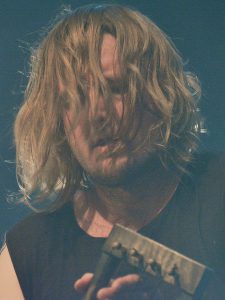 |
Digging a bit into the music of Pekko Käppi you will see in an instant that it is hardly to be described in genres or categories, if not as such like outstanding, unique or very own. It has so many shades and flavours it’s hard for me to put into appropriate words. So I don’t even try but suggest: listen to it yourself.
As he and his band had a show at Tuska I took the opportunity to meet him and learn more about his background, his instrument and attitude. Let’s meet Pekko Käppi. |
Crossing bridges
“My honour meeting you Pekko, really. I saw you with Amorphis last summer and that was a most impressive show. Could you tell me how this cooperation came to be?” – “Well my manager contacted me because she is the head producer of Huvilatelta. And she kind of proposed this. And also to Amorphis. I guess they had like an idea to invite people to collaborate with them. But that was that. And, of course, I said yes.”
“So crossing bridges with your music is important to you?” – “Oh, yeah, yeah, all my life I have been doing that kind of things, hanging around with all kind of musicians from different genres but also like between different styles of art. I find it really, really important to do so because it’s kind of silly to have this narrow path while the world is really kind of broad and there are many things to discover.”
I wonder if there are bridges that are more easily built. “Do you think there are genres that are more easily combined or bridged than others?” – “Well, not really. I think they are all kind of the same. For instance if we’re talking about music. Because it is music. And if you take away like the stylistic features from the surface, it’s all the same notes, it’s all singing, all playing. So I don’t really see much differences. Of course, I know I am a bit idealistic in that because people don’t think that way and people like having these kind of … what do you say? Not boundaries, but kind of slots, because it makes life easier to say this is this and this is that. Often when journalists ask me to describe my music, it is really, really difficult to say. So I try these days to invent something. I found it … it’s just music or whatever. But for me it’s really, really important because you would die inside or I would die inside if I’d do only one thing.”
“The freedom of choice to do different things is even more important then.” – “I think doing things, you just do things to me. To stay active. Because, it’s good for my head and so on. I think … “ he is searching for an appropriate term. “I think a kind of a holistic way … just like to act something and keep going to some directions or to many directions. But I think, it’s me so I. It’s like proto-sense it’s like one direction but still it’s like many directions. It sounds a bit hippy. But something like that.” –
“Yah, but I think I get the picture you wish to transfer.” But then I wonder, if “It is about the creation or about to express yourself? Which of those two parts is, let’s say, the stronger one?” – “I think, well, this is a boring answer again. It has many sides. A big feature is, of course, expressing yourself, but I think the contact with other people is crucial, with other colleagues and with like from other artists but also then the contact with the audience…” – “during the shows?” “Yeah, of course but also through the albums and such. The best case scenario is the album I produce it kind of starts to live their own life.” He seems still not fully happy with the terms. “Some kind of auto dynamics?” comes to my mind. He looks up “oh, yeah, yeah, yeah.”
“I noticed during the concert [meaning Huvilathelta]that you are very intensively focused on your music. Do you actually notice that much of the audience, the reaction of the audience and stuff like that?” –“Hmmm” he is thinking. So I add, “You even seem to be a bit off at times or better diving very deeply into your music.” – “Hmmm. Yah. I often don’t have like direct eye contact, like in the Huvilatelta cause it’s full of people. And you can sense them if your eyes are closed. And I usually play with my eyes closed because it helps me to focus. But I listen. And listening the audience is like a mystique feedback from the audience. They would be silent, it’s important. But if you’re producing music on the stage I try to listen to everyone on stage. So that’s kind of my own world. I try to share it by playing.”
On the same road together
 “If you bring a new instrument, your instrument that has not been part of the arrangements before like back at Huvilatelta what is this like? Is it hard to find your niche in a song or in a band in a situation, when most likely the band is very much used to play together, is playing tightly and all this?” – “Hmm”, he says considering a moment, “Well, it depends. In that concert it wasn’t. It felt really familiar although I didn’t know them before. We met like the night before, and then we rehearsed, and then it was show. But they had some work in the arrangements like clearing spots for me, and the guests. So that’s maybe this. But I think the most important thing for me was that it was quite easy to relate to the group somehow. Although you kind of notice when you come into such a situation. You can notice the dynamics that they have in playing a lot together. But they were really kind of open – at least it felt that they were really kind of open-minded, and they were really warm. They really welcomed me to be there. And everything was made very easy for me to be there.”
“If you bring a new instrument, your instrument that has not been part of the arrangements before like back at Huvilatelta what is this like? Is it hard to find your niche in a song or in a band in a situation, when most likely the band is very much used to play together, is playing tightly and all this?” – “Hmm”, he says considering a moment, “Well, it depends. In that concert it wasn’t. It felt really familiar although I didn’t know them before. We met like the night before, and then we rehearsed, and then it was show. But they had some work in the arrangements like clearing spots for me, and the guests. So that’s maybe this. But I think the most important thing for me was that it was quite easy to relate to the group somehow. Although you kind of notice when you come into such a situation. You can notice the dynamics that they have in playing a lot together. But they were really kind of open – at least it felt that they were really kind of open-minded, and they were really warm. They really welcomed me to be there. And everything was made very easy for me to be there.”
“Have you had contrary experience?” – “Of course, there have been many, many different experiences. I think that was one of the easiest in a way, like in dynamic. But of course, any kind of project is kind of an individual project and people are different. So … but I consider myself quite easy, and I find my spots in the music. And I try not to push myself to the centre. So I like to contribute and like to stay out of the way.“
“To me at Huvilatelta it felt a bit like a snake. You were a bit winding through: always there, never being too much, too loud, too dominant, yet always well perceivable and audible. On the other hand your parts were a bit of warm coat. So I felt your music felt deep inside and in the same moment all around the songs.“ – “Yeah, yeah. I think that is really well said. It kind of felt like that to me. It is hard to explain. But it was really, really easy and relatable to play with them. Although I didn’t have much experience of doing that kind of material before. But I noticed as well, it is kind of the same thing I am doing as well not in a really obvious way. But I think we share that we are on kind of the same road together in the world of music, I think.”
Every time they’re born again
“How important is it for you to play live anyway?” – “REALLY important”, he says. But then “because sometimes I heard other musicians say that the creation part is more important to them while yet others point out the rehearsing and group dynamics to be a bit more important than all the rest. So everybody has his own very focus.” – “But I think it is really important to go outside of our own bubble. The bubble thing is also important because you have to spend time with yourself and create something. But I think with our band it is really important to play because our songs they start to live their own life when we play them live. Then they change and they keep evolving. Every time it is kind of re-birthing. Or I don’t know, what’s the proper term? Every time they’re born again.” I find this a wonderful image providing a deep insight into the attitude of this outstanding musician, who is comprehending his music a living being. His attitude reminds me a bit to the early times of recorded music when musicians had hard times learning to repeat their parts in exactly the same way over and over again instead of adjusting it to the situation, audience or their own moods in this very moment. Today the number of musicians interpreting their own songs on stage is sinking rapidly as the audience is mostly used to recorded music, and does often consider this the only correct way of playing a song. It seems to be ignorant to creativity and freedom of arts, in my mind. “Because otherwise I just could stay inside and not meet anyone”, Pekko continues. “I don’t find myself so interesting. I need other people to kind of stay focused.
The Jouhikko
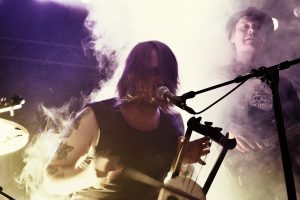 “Actually I would also like to know a little more about your instrument. I am sorry, I keep forgetting the name. So I am very sorry, what was its name again?” – “My main instrument is jouhikko and it’s some kind of Karelian bowed lyre. So technically it’s a lyre and as such it has like thousands of years of history.” – “It has”, I mention although I did not intend saying anything. “Through out the ages it has also been played in Europe. And for example in the graves of the Viking kings or of the Lords, archaeologists have found really beautiful lyres with gold and really nice details. But then maybe it’s wake theory because we don’t know much about it. So about a thousand years ago the innovation of bow arrived to Europe and then it starts to play the lyre with the bow and so the bowed lyre. So roughly hundred years ago there was only a hand full of players left in Karelia and also in the Swedish speaking islands of Estonia. But the tradition wasn’t really living strongly because there had been all kinds of instrument innovations. And they were more flexible and more like louder in sound. So that’s kind of the thing.”
“Actually I would also like to know a little more about your instrument. I am sorry, I keep forgetting the name. So I am very sorry, what was its name again?” – “My main instrument is jouhikko and it’s some kind of Karelian bowed lyre. So technically it’s a lyre and as such it has like thousands of years of history.” – “It has”, I mention although I did not intend saying anything. “Through out the ages it has also been played in Europe. And for example in the graves of the Viking kings or of the Lords, archaeologists have found really beautiful lyres with gold and really nice details. But then maybe it’s wake theory because we don’t know much about it. So about a thousand years ago the innovation of bow arrived to Europe and then it starts to play the lyre with the bow and so the bowed lyre. So roughly hundred years ago there was only a hand full of players left in Karelia and also in the Swedish speaking islands of Estonia. But the tradition wasn’t really living strongly because there had been all kinds of instrument innovations. And they were more flexible and more like louder in sound. So that’s kind of the thing.”
“How did you get interested in playing the jouhikko and how did you learn? There can’t be too many teachers or even schools?” – “Yeah. Well, I found about by accident. I was like around my twenties. And I was quite bored with my musical life by that time, and I was kind of actively searching for something. But I didn’t really know what. I was getting more and more curious about Folk music. And I read this article about Finnish Folk instruments and there was this small chapter about jouhikko that only described really simply what it is. And I remember the moment because it like struck me and I said: ‘Wow!’ I liked the idea of the instrument, and then I tried to find out about that instrument. But first it was really slow to find anyone. But then I found out there is this school in Kaustinen. It is this small town in the middle parts of Finland. They have this Folk music school, and it was possible to study the instrument there. And it was like a one-year course. And I applied there and got in, and started to play there. But that was like, well, twenty years ago. But after that it’s been kind of up to me. In a way I am still on the same path of finding out about it. So I have played thousands of hours, I don’t know”, he says laughing.
“But still you find new inspiration or new ideas how to use the instrument?” – “Yeah and I try to be influenced all the time. It’s good for the brain to be curious about the world and also musical world, and different genres and traditions and old or new. It is like this constant adventure for me, I think.”
“So being a student at the school you had access to the instrument, of course. But after that, it is not the kind of instrument you go into a shop and just buy one”, I say wondering about his currently used instrument that has an ornamental skull. “No, no”, he replies. “Like after school, I met this instrument building master, Rauno Nieminen, who is kind of the grandfather of the renaissance of jouhikko. And then we got along and made friends with him. And we have known now for I think like 15 years. And we are really good friends, and he has made all my instruments, and we are developing at the moment new like instruments. All the time something new.”
I’ve found my path into the idea of this kind of medieval instrument and wonder on several things at the same moment. “It must be really tough for him to build this instrument when you are lacking a precise idea how to do it. I mean: there are millions of guitars or violins. And there are many master pieces of unique violins but still building such a masterpiece is a very rare event and despite the numbers and current traditions in building this instrument there is no general recipe or protocol tell you how to end up building the masterpiece and not just a normal one. And then narrow that down to there are hardly any more people being able to build this kind of instrument at all. So I wonder how did he get his expertise? Does he have to rely on trial and error?” – “I think this is one of the main features for the instrument makers: trial and error and also the feedback from the players. Because now when I played like twenty years I have like different desires what I want the instrument to sound like. And how it should look like and things like that“ he replies sounding respectfully.
“And of course, different kinds of wood will have a different sound and stages of growing, drying and aging of the wood will also.” – “Oh yes”, Pekko agrees in a long sigh. “Yeah and that is to me like a total mystery. I don’t know anything about that.”
“So you just can say it sounds like I want it to sound or not?” – “Yeah, yeah, something like that. It’s all some kind of – for example with the electric Jouhikkos, we have been like making the prototypes for a couple of years. And we have a kind of a second generation coming up. So maybe when I have used the Jouhikkos for like five years, and played a lot of gigs, so I have like many ideas what I would like to do more or easier. And of course about sound-wise, because I have certain aesthetics. Because nowadays, there are like many jouhikko players. It’s really marginal but there are tens of players at least.” Laughing I comment: “So you are not totally alone, at least.” Pekko replies laughing himself: “Yeah, and I don’t know any jouhikko player anymore! It is a good sign that there is something happening. It is played not maybe globally but still it are like players from different countries. They make their own style. So for example, I met a couple of years ago this Einar Selvik from Wardruna, this Norwegian band. And he is a very good jouhikko player. But he has his totally own idea how to play. But I think that is a really, really good thing. I mean with guitar players it’s the same.” – I nod agreeing. “I think it is like that with all kind of instruments. Although you might kind of be able to identify some kind of groups playing roughly similar, in the end each is unique in his/her way to play.” – “Oh yeah, true” Pekko agrees with me.”
Outcasts and melancholy
“I watched some of the videos of your latest gigs and some of the videos produced for the individual songs. And I have come to the notion that you have a particular liking for those who are not fully accepted by society, those who stand or are pushed a bit on the edge, some kinds of misfits. Do you write story-like lyrics about those individuals?” – “Of course it’s that. I think it’s in every era of history that I think people who were a bit different were like considered somehow scary or … What would be the correct term? Or worrisome. Or they are for different reasons pushed aside. But for me it is really important that you kind of have your own sound. At least now that I am grown up I can do whatever I want. – Not to kill anyone or to be an evil person. Or at least try to be as good as you can”, he says laughing. “Hm that sounds really weak but that’s one thing. But in societies people who are doing things differently they are considered to be not monsters but somehow. And I remember when I was young, and I was like wearing these black pants and I went to this kind of club house for youth. The kind of friends of me they didn’t accept that. And they wanted to rip these off from me. So that’s how it is in small towns. I don’t know if I answer to your question. But I found that really interesting and I read a lot about those who carry on their own way and are not really caring what people are saying. So there is some hidden social commentary, maybe. But still I like good stories and mystic stories and kind of these upside-down worlds.”
“So your stories focus on single persons and on their fate or more their emotional being or state?” – “Hm, well. For example we have this in our previous album. We have this story about Pika Karin. And she was sentenced to death roughly four hundred years ago because she was thought to be a witch. She put spells on her turnip fields because she really was worried that someone would steal them or something. And so was telling the officials that she was doing witchcraft. And so she was sentenced. You know that is really kind of”, he considers a second, “it might still be happening not in the same scale but somehow. ‘That is a weird person and you should not do that kind of think.’ Although she wasn’t harming anyone. That is a really intriguing story somehow. She really was doing some spells and some witchcraft. But then she wasn’t hurting anyone.“ – “She was no more than protecting her own property”, I comment. “Yeah, yeah, yeah. And that is what people are still doing, like building fences around the houses.” In the end it is true. What she did was nothing more than some kind of fence.” Laughing Pekko adds: “I have no idea if I answered your question.” Perhaps that is the moment to explain our whereabouts. The location of the Tuska festival is a former gas plant. The stage at which Pekko played was inside one of the buildings. This back stage area was behind that very building meaning next to one of the main roads leading down town. Music from the stages was adding to the traffic noise. And that is one of the main lacks of Tuska. There is hardly a place during the shows you can talk to someone without shouting at the person. So as much as we tried to focus on the conversation and the other one’s voice with a group of Harley’s driving by or the band playing inside while another one did so on the main stage and third one doing the sound check on the tent stage we had our difficulties simply to hear the other one.
I check my list of questions and explain: “I have a bit of an ‘hen-and-egg’ question, so what was first. It is about the melancholy in Finnish as much as your music. Actually I have read and heard a lot of times that melancholy is kind of omnipresent in Finland, its culture, its music, its people, perhaps even in the simple yet very functional architecture. Is the melancholy in music the symptom or the cause? Is this melancholy a feature or stimulated by external factors such as music?” – “I think there is both, certainly. I think it started somehow in the 1800s with a national, European, romantic 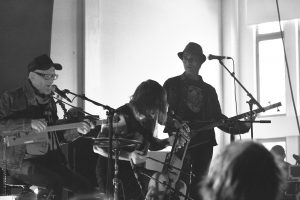 movement when upper class people wanted to discover folk. I think it was this kind of pan-European phenomena. It certainly was in Finland ‘cause they were trying to find the history of the Finnish people from their points of view. But there were different folk cultures, such as the Eastern and the Western culture that were quite different from the Southern and Northern. So they were kind of cherry picking and things. So I think there is a certain, like artificial kind of thing but still it started to live its own life in a way. So you can’t deny that. And I know there is lots of melancholic people in Finland with the suicide rates so high”, he says laughing knowing exactly that a serious issue as depression is not explained by some superficial melancholic feeling. “At least they used to be”, he continues, “I don’t know statistically how high they are compared to other countries. But statistically if you research like the folk tunes from the past 200 years or so, they are not necessarily melancholic at all. There is something in between. And for me it is important to make contrasts. So you have like really a terrible story with murder and blood and strong or weird psychological situations. You don’t have to underline it with music. At least doing it in minor or in a really dark and gloomy way. So you can insert kind of more cheerful things.” – “Brighter stuff?” – “Yeah. ‘Cause I find it really boring to sing the song in the minor only. Of course, you can do it. But life isn’t black and white, you know.” – “No, it is always all kinds of things and shades”, I agree. “Sadness isn’t really dark. The sun can still be shining really bright and you still can be really miserable. Butterflies are flying. But you can be really down.” I mention that all the brightness and life around you might provide the strength or the energy it takes to get over it. And Pekko illustrates in reply the opposite situation: “And still it can be dark and the sun not shining at all for months like in Finland and you can be bright and happy for some reasons.” So his songs are meant to show how life is: sometimes very intense and full of extremes in the same moment.
movement when upper class people wanted to discover folk. I think it was this kind of pan-European phenomena. It certainly was in Finland ‘cause they were trying to find the history of the Finnish people from their points of view. But there were different folk cultures, such as the Eastern and the Western culture that were quite different from the Southern and Northern. So they were kind of cherry picking and things. So I think there is a certain, like artificial kind of thing but still it started to live its own life in a way. So you can’t deny that. And I know there is lots of melancholic people in Finland with the suicide rates so high”, he says laughing knowing exactly that a serious issue as depression is not explained by some superficial melancholic feeling. “At least they used to be”, he continues, “I don’t know statistically how high they are compared to other countries. But statistically if you research like the folk tunes from the past 200 years or so, they are not necessarily melancholic at all. There is something in between. And for me it is important to make contrasts. So you have like really a terrible story with murder and blood and strong or weird psychological situations. You don’t have to underline it with music. At least doing it in minor or in a really dark and gloomy way. So you can insert kind of more cheerful things.” – “Brighter stuff?” – “Yeah. ‘Cause I find it really boring to sing the song in the minor only. Of course, you can do it. But life isn’t black and white, you know.” – “No, it is always all kinds of things and shades”, I agree. “Sadness isn’t really dark. The sun can still be shining really bright and you still can be really miserable. Butterflies are flying. But you can be really down.” I mention that all the brightness and life around you might provide the strength or the energy it takes to get over it. And Pekko illustrates in reply the opposite situation: “And still it can be dark and the sun not shining at all for months like in Finland and you can be bright and happy for some reasons.” So his songs are meant to show how life is: sometimes very intense and full of extremes in the same moment.
All these contrasts provide a proper bridge for me to my final, the odd question I introduce then. “Imagine I am leaving in a couple of minutes and in stead of me an elephant pops up.” – “Sorry, again please”, Pekko simply says. I repeat and continue illustrating the setting of an elephant following Pekko at his heels threatening to ruin his gig. He just calmly says: “Well the elephant wouldn’t ruin the gig. It would make it just really interesting for everyone. But would the elephant be you or just an elephant?” – “Just a random elephant but you can’t get rid of it.” – “Well than you have to invite the elephant to take part in the show. I have nothing against that.” I point out that the elephant is rather big compared to the stage and might draw a bit of the attention on itself. As I suggest that the elephant might join in making music yet not fitting the tunes, Pekko replies “Yeah but I think that might be ideal. There would be an elephant. Everybody would understand that there is an elephant and that there is nothing to worry about.” – “Crossing another genre?” – Passionately he agrees, “yeah, yeah, yeah. Although, I don’t know. Maybe it depends if it is a really angry elephant. Still it is a really big animal. I would not worry. But it would be really interesting to play with elephants.”
Laughing I thank for the interview as does Pekko, also still smiling at the idea of elephants on stage with him.
Walking to meet my friends I think about his ideas of illustrating life as colourful and weird and full of contrasts as it is.
And then he seems to know or at least not to accept any boundaries in music. And even this illustrates life. And it reflects the openness I have met so often this year – the openness of the metal community that I am so grateful for all the more as discrimination is rising all everywhere.
Personally, I find Pekko very special – in the best of senses. It is not the first time I met a person who had a hard time as kid or teenager for being bullied by small-minded people but ends up being an outstanding artist. Sometimes it even seems that some kind of outcast childhood provides a fertile ground for prosperous arts. Even more I think that mainstream and outstanding arts hardly go together. And I find it all the more remarkable that those being called misfit or freak as child as adult become an artist are adored by the audience for being different from the mainstream.
More photos from their Tuska show.

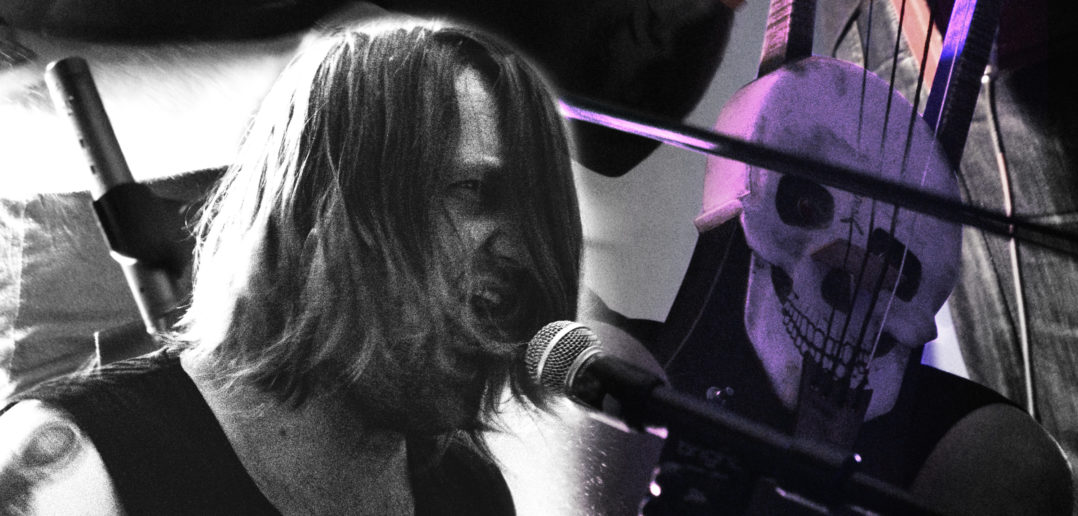


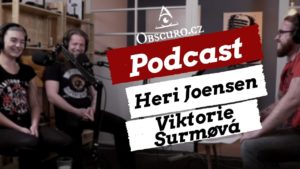
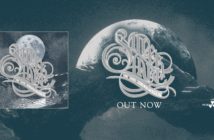
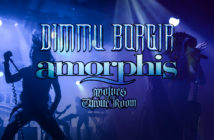
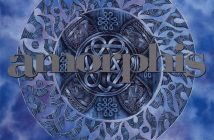
[…] They really have made it! Waltari songs became songs of the featuring artists, even entirely new songs came up like “Ehtoopuolella” or perhaps “Misty Man 2021”. This makes it all the more 100 % Waltari, 100 % fun and the best promotion for diversity – be it in music or beyond! It is like Pekko Käppi said once: “And if you take away like the stylistic features from the surface, it’s all the same notes, it’s all singing, all playing. So I don’t really see much differences” (check out the interview). […]